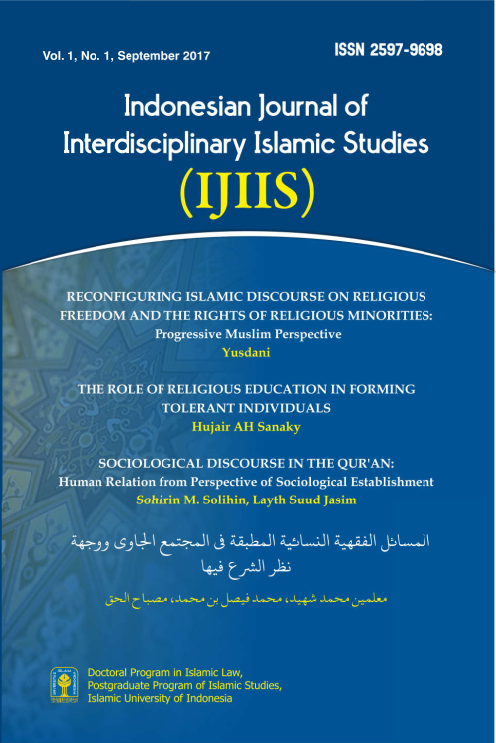Main Article Content
Abstract
This article underlines the epistemological miss-conception of knowledge in Islam which has been offered by many Muslim scholars. Muslim scholars tend to divide knowledge into fardl al-kifayah and fardl ‘ain. This miss-conception could lead into secular paradigm where there are Islamic science and non-Islamic science. On the contrary, Islam actually has given comprehensive guide to all aspects of life. Islam did not classify knowledge to thus classification nor to sacred and mundane knowledge. However, some Islamologists, especially Western ones, like to state that Islam has nothing to do with science, especially natural ones. Hence, this article concentrates particularly on technology in Islam. These issues are discussed especially based on perspectives of Said Nursi, Ismail Raji al Faruqi, and Sir Syed and Maududi. As results, this article proves that Islam has done more than Christianity to science. Furthermore, the development of technologies in the West nowadays was originally founded by Islam. Unfortunately, because of the secular ideology, Moslems have forgotten those historical-scientific facts. This brings people to separate religious values such as ethics from natural sciences. Therefore, this article finally invites Moslems to think of integrative approach since the aim of Islamic education is to produce an integrated and perfect individual, insān kāmil.
Keywords: Islamization, Secularism, Orientalism, Islamic education, Islamic science, History of science.
Article Details
References
- Armstrong, Karen, Muhammad: Prophet for Our Time. London: Harper Perennial, 2007.
- Crone, Patricia and Michael Cook, Hagarism the Making of the Islamic World. London: Cambridge University Press, 1997.
- Fuller, Graham E. A World without Islam. New York: Little Brown and Company, 2010.
- Ghazali, Muhammad Al-. A Thematic Commentary on the Quran. Translated by Ashur A. Shamis. Herndon: International Institute of Islamic Thought., 2000.
- Hussain, M G, Muslim Youth and Madrasa Education. New Delhi: IOS, 2004.
- Iqbal, Muhammad, Reconstruction of Religious thought in Islam. Lahore: Iqbal Academy.
- Isfahani, Imam Raghib. Mufaradât al-Qur`ân. Translated by Maulana Muhammad Abduhu Firozepori. vol.2. Lahore: Kashmir Block Iqbal Town.
- Karim, Maulvi Abdul, A Simple Guide to Islam’s Contribution to Science and Civilisation. Calcutta: Good Word Books, 1935.
- Larsen, Kristine. Stephen Hawking –A biography. Delhi: Jaico Publishing House, 2010.
- Manzoor, Jamaluddin Muhammad ibn Mukarram ibn. Lisân al-‘Arab, vol. 14. Beirut: Daru Sadir, 1997.
- Mubarakpuri, Maulana Qazi Athar, Khayr-il-al-Quran ki Darsgahain aur unka Nizam-I- Tailim wa Tartib. Deoband: Shayk al-Hind Darul al-Ulum, 1995.
- Nadvi, Mawlana Hanif, Aqiliyat Ibn Taimiyah. New Delhi: Areeb Publications, 2005.
- Penrose, Sir Roger, The Emperors New Mind. Oxford: Oxford University Press, 1999.
- Rafiabadi, Hamid Naseemm, History of Science, Philosophy and Culture in Indian Civilisation. vol. 5. Edited by Mohammad Rafique. New Delhi: Centre for studies in Civilisations, 2009.
- Rafiabadi, Hamid Naseem, A Brief Introduction to Islamic Epistemology Ilm al Kalam and Muslim Philosophy. Srinagar: City Book Centre, 2010.
- Siddiqui, Hafizur Rahman, Science from the Muslim World into Europe, in Quest for New Science. Edited by Rais Ahmad etc. Aligarh: Centre For Studies on Science, 1984.
- Siddiqui, M. R. and M .M .Sharif, A History of Muslim Philosophy. Vol.2. Delhi: Low Price Publications, 1989.
- Watt, William Montgomery, Islamic Fundamentalism and Modernity. London: Routledge, 1988.
- Zohara, Abdul Kalam, Wings of Fire; An Autobiography. Hyderabad: Universities Press, 2005.
References
Armstrong, Karen, Muhammad: Prophet for Our Time. London: Harper Perennial, 2007.
Crone, Patricia and Michael Cook, Hagarism the Making of the Islamic World. London: Cambridge University Press, 1997.
Fuller, Graham E. A World without Islam. New York: Little Brown and Company, 2010.
Ghazali, Muhammad Al-. A Thematic Commentary on the Quran. Translated by Ashur A. Shamis. Herndon: International Institute of Islamic Thought., 2000.
Hussain, M G, Muslim Youth and Madrasa Education. New Delhi: IOS, 2004.
Iqbal, Muhammad, Reconstruction of Religious thought in Islam. Lahore: Iqbal Academy.
Isfahani, Imam Raghib. Mufaradât al-Qur`ân. Translated by Maulana Muhammad Abduhu Firozepori. vol.2. Lahore: Kashmir Block Iqbal Town.
Karim, Maulvi Abdul, A Simple Guide to Islam’s Contribution to Science and Civilisation. Calcutta: Good Word Books, 1935.
Larsen, Kristine. Stephen Hawking –A biography. Delhi: Jaico Publishing House, 2010.
Manzoor, Jamaluddin Muhammad ibn Mukarram ibn. Lisân al-‘Arab, vol. 14. Beirut: Daru Sadir, 1997.
Mubarakpuri, Maulana Qazi Athar, Khayr-il-al-Quran ki Darsgahain aur unka Nizam-I- Tailim wa Tartib. Deoband: Shayk al-Hind Darul al-Ulum, 1995.
Nadvi, Mawlana Hanif, Aqiliyat Ibn Taimiyah. New Delhi: Areeb Publications, 2005.
Penrose, Sir Roger, The Emperors New Mind. Oxford: Oxford University Press, 1999.
Rafiabadi, Hamid Naseemm, History of Science, Philosophy and Culture in Indian Civilisation. vol. 5. Edited by Mohammad Rafique. New Delhi: Centre for studies in Civilisations, 2009.
Rafiabadi, Hamid Naseem, A Brief Introduction to Islamic Epistemology Ilm al Kalam and Muslim Philosophy. Srinagar: City Book Centre, 2010.
Siddiqui, Hafizur Rahman, Science from the Muslim World into Europe, in Quest for New Science. Edited by Rais Ahmad etc. Aligarh: Centre For Studies on Science, 1984.
Siddiqui, M. R. and M .M .Sharif, A History of Muslim Philosophy. Vol.2. Delhi: Low Price Publications, 1989.
Watt, William Montgomery, Islamic Fundamentalism and Modernity. London: Routledge, 1988.
Zohara, Abdul Kalam, Wings of Fire; An Autobiography. Hyderabad: Universities Press, 2005.
